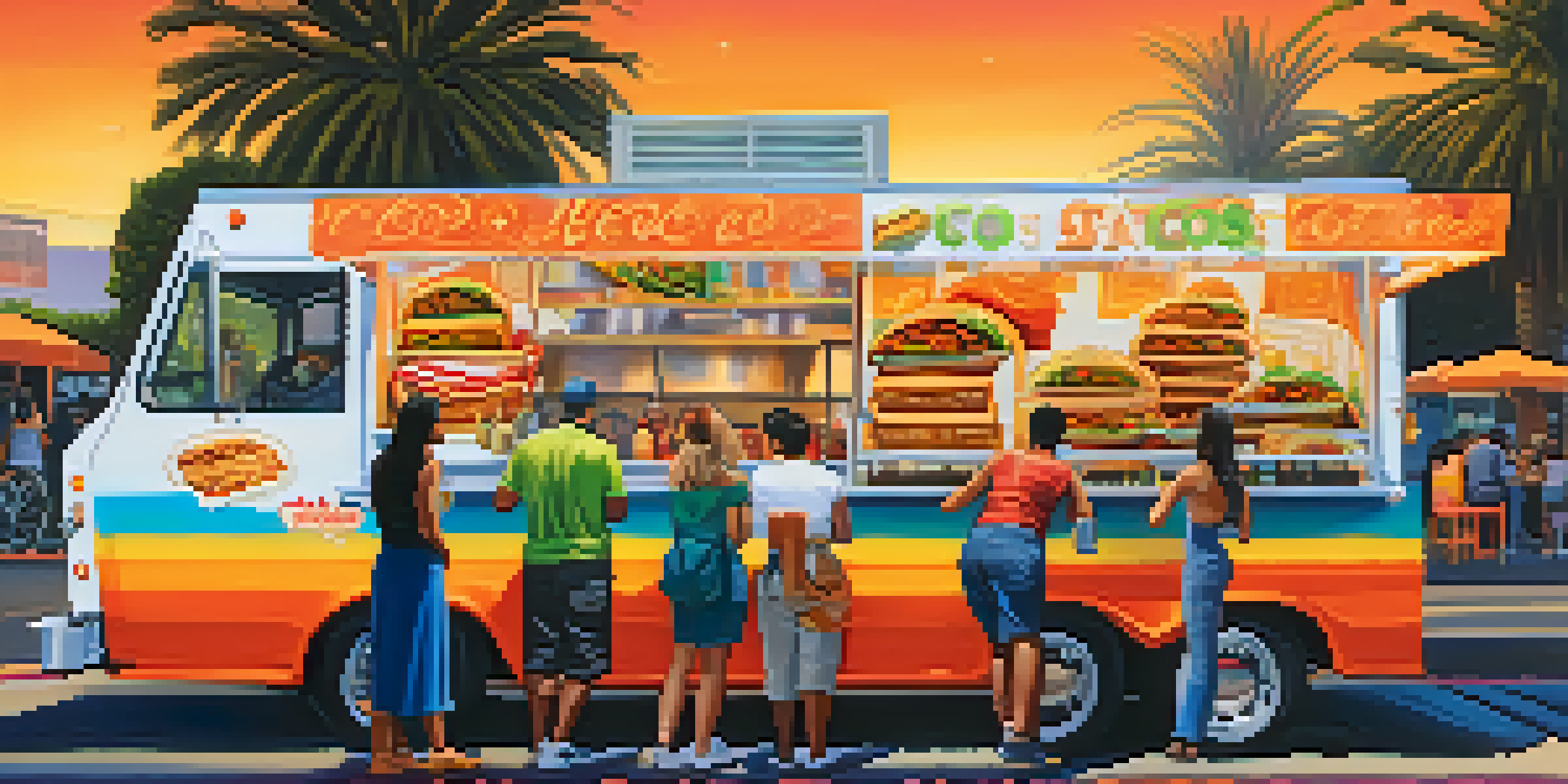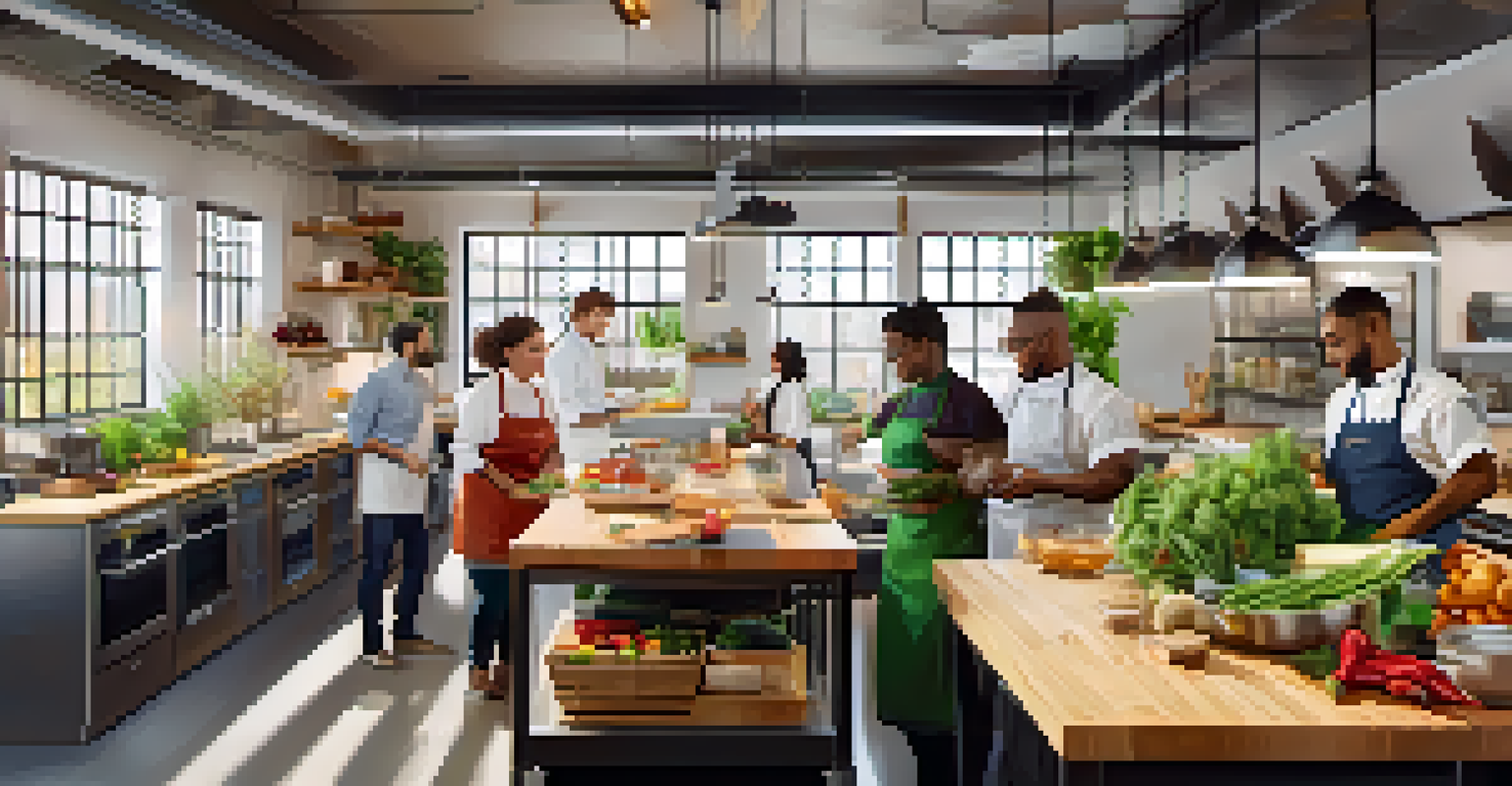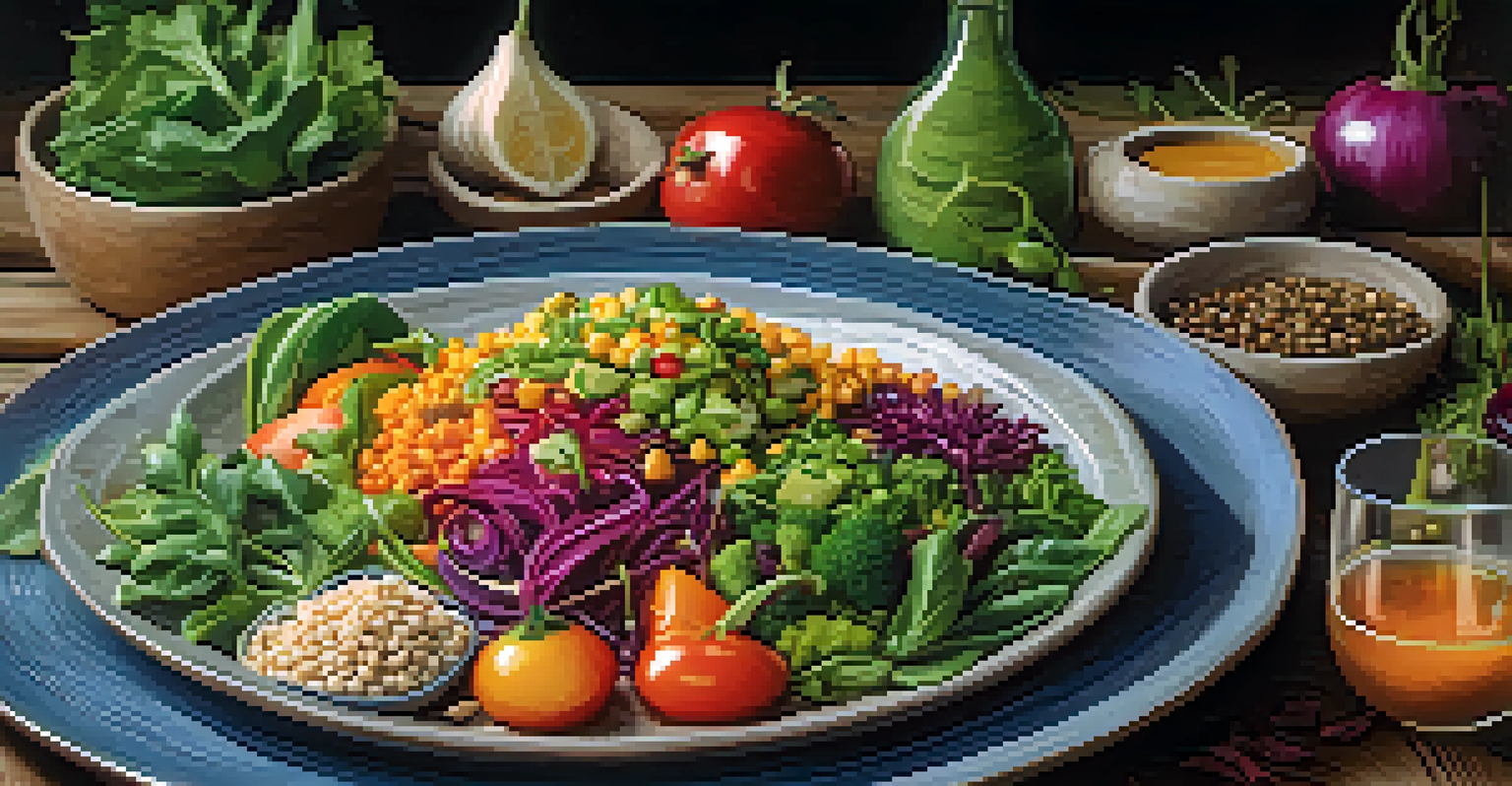The Rise of Food Startups in Los Angeles: A Trend Analysis

The Culinary Melting Pot of Los Angeles
Los Angeles is often referred to as a culinary melting pot, showcasing a vibrant mix of cultures and cuisines. This diversity has paved the way for innovative food startups that reflect the city's unique character. From food trucks serving gourmet tacos to artisanal bakeries specializing in fusion pastries, the options are endless.
Food is our common ground, a universal experience.
The city's dynamic population fuels the demand for novel food experiences, driving entrepreneurs to experiment with flavors and presentation. This push for creativity not only attracts locals but also curious tourists eager to taste the latest trends. Food startups in LA are not just businesses; they are cultural expressions.
Moreover, the collaborative spirit among chefs and food enthusiasts in LA encourages the sharing of ideas and resources. This sense of community fosters an environment where food startups can thrive, leading to the emergence of new concepts that often challenge traditional dining norms.
Tech Meets Food: The Digital Influence
In today's digital age, technology plays a crucial role in the rise of food startups in Los Angeles. Platforms like Instagram and TikTok have transformed how food is marketed and consumed, allowing startups to showcase their offerings visually. This has led to the phenomenon of food trends going viral, often overnight.

Entrepreneurs are harnessing these platforms to reach wider audiences, utilizing engaging content to attract followers and potential customers. For instance, a simple video of a unique dish can generate massive interest, leading to long lines at food trucks or pop-up events. The intersection of tech and food has revolutionized customer engagement.
Diverse Culinary Landscape in LA
Los Angeles is a vibrant melting pot of cultures, driving innovative food startups that reflect unique culinary expressions.
Additionally, food delivery apps have made it easier for startups to reach customers who prefer dining at home. This convenience has opened up new revenue streams for budding businesses, enabling them to focus on innovation and quality without the burden of a traditional brick-and-mortar setup.
Sustainability as a Driving Force
Sustainability has become a significant trend among food startups in Los Angeles, reflecting a growing awareness of environmental issues. Many entrepreneurs are prioritizing locally sourced ingredients, reducing waste, and using eco-friendly packaging. This commitment to sustainability resonates with health-conscious consumers who are increasingly aware of their food choices.
You don’t have to cook fancy or complicated masterpieces—just good food from fresh ingredients.
For example, several startups have embraced plant-based menus, catering to the rising demand for vegetarian and vegan options. By tapping into this market, they not only promote healthier eating habits but also contribute to a more sustainable food system. The shift towards sustainable practices is not just a trend; it’s becoming a core value for many new businesses.
Furthermore, collaborations with local farmers and markets help to bolster the community and create a more resilient food ecosystem. These partnerships ensure that startups have fresh, high-quality ingredients while supporting the local economy.
Challenges Faced by Food Entrepreneurs
While the food startup scene in Los Angeles is thriving, it's not without its challenges. Entrepreneurs often face fierce competition, especially in a city known for its culinary innovation. Standing out in a crowded market requires a unique concept, strong branding, and effective marketing strategies.
Additionally, navigating the regulatory landscape can be daunting for new food businesses. Compliance with health and safety regulations, securing permits, and managing food costs are just a few hurdles that entrepreneurs must overcome. This complexity can be overwhelming, especially for those new to the industry.
Tech Revolutionizes Food Marketing
Social media platforms like Instagram and TikTok have transformed how food startups market their offerings, enabling trends to go viral.
Moreover, the unpredictability of consumer preferences means that startups must be agile and ready to pivot. Trends can change rapidly, and staying relevant requires constant adaptation and creativity. However, those who succeed in overcoming these challenges often find their efforts rewarded with a loyal customer base.
The Role of Incubators and Co-Working Spaces
Incubators and co-working spaces have become vital resources for food startups in Los Angeles. These shared environments provide entrepreneurs with access to commercial kitchens, mentorship, and networking opportunities. For many, this support is crucial in turning a passion for food into a viable business.
Programs offered by these incubators often include business training, marketing assistance, and funding resources. This comprehensive approach helps startups navigate the complexities of launching a food business while fostering collaboration among like-minded individuals. The sense of community found within these spaces can be incredibly motivating.
Additionally, having access to professional kitchen facilities allows food entrepreneurs to experiment and refine their recipes without the high overhead costs of a standalone restaurant. This flexibility encourages innovation, making it easier for startups to test new concepts before fully committing to their business model.
The Impact of Social Media on Food Trends
Social media has revolutionized the way food trends emerge and spread, with Los Angeles at the forefront of this phenomenon. Platforms like Instagram serve as visual showcases for food startups, allowing them to create a strong online presence. The aesthetic appeal of dishes is often just as important as taste, driving entrepreneurs to focus on presentation.
Food trends such as 'raindrop cakes' or 'rainbow bagels' often gain momentum through viral posts, leading to a surge in demand. Startups that can effectively leverage social media can capitalize on these trends, drawing in crowds eager to experience the latest culinary sensation. It’s a powerful marketing tool that can make or break a new food business.
Sustainability Drives Business Practices
Many food startups in LA prioritize sustainability by using locally sourced ingredients and eco-friendly practices to appeal to health-conscious consumers.
Moreover, engaging with customers through social media fosters a sense of community and loyalty. Startups that share behind-the-scenes content or interact with their followers create a connection that goes beyond just food. This relationship can turn casual diners into devoted fans who eagerly anticipate new offerings.
Future Predictions for LA's Food Startup Scene
The future of food startups in Los Angeles looks bright, with trends indicating continued growth and innovation. As consumer preferences evolve, we can expect to see more emphasis on health-conscious options, sustainability, and unique dining experiences. Entrepreneurs are likely to explore new culinary frontiers, combining global flavors and techniques.
Moreover, the rise of technology in the food industry will continue to shape the landscape. From advanced delivery systems to AI-driven menu recommendations, startups that embrace these advancements will have a competitive edge. The integration of tech will streamline operations and enhance customer experiences.

Finally, as the city embraces its diverse culinary heritage, we may see a surge in startups focused on underrepresented cuisines. This celebration of culture not only enriches the local dining scene but also offers opportunities for entrepreneurs to share their heritage through food. The future promises to be as exciting as the present, filled with endless possibilities for LA's food innovators.